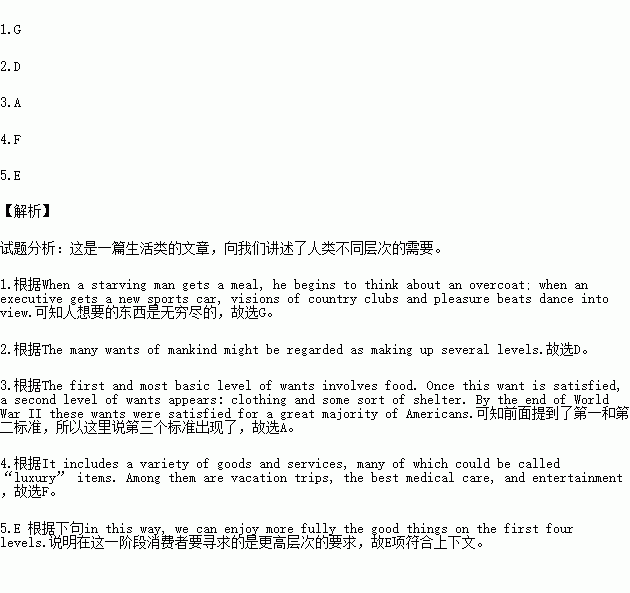题目内容
七选五。
1. When a starving man gets a meal, he begins to think about an overcoat; when an executive gets a new sports car, visions of country clubs and pleasure beats dance into view. The many wants of mankind might be regarded as making up several levels. 2. .
The first and most basic level of wants involves food. Once this want is satisfied, a second level of wants appears: clothing and some sort of shelter. By the end of World War II these wants were satisfied for a great majority of Americans. 3. It included such items as automobiles and new houses.
By 1957 or 1958 this third level of wants was fairly well satisfied. Then, in the late 1950s a fourth level of wants appeared: the “life-enriching” level. While the other levels involve physical satisfaction-the feeding, comfort, safety, and transportation of the human body-this level stresses mental needs for recognition, achievement and happiness. It includes a variety of goods and services, many of which could be called “luxury” items. Among them are vacation trips, the best medical care, and entertainment. 4.
On this level, a greater percentage of consumer spending goes to services, while on the first three levels more is spent on goods. Will consumers raise their sights to a fifth level of wants as their income increases, or will they continue to demand luxuries and personal services on the fourth level?
A fifth level probably would involve wants that can be achieved best by community action. Consumers may be spending more on taxes to pay for government action against disease, ignorance, crime and prejudice. 5. In this way, we can enjoy more fully the good things on the first four levels.
A. Then a third level appeared.
B. Different people have different wants on each level.
C. There are several levels of wants in one’s life.
D. When there is money enough to satisfy one level of wants, another level appears
E. At this stage, we now may seek to ensure the health, safety, and leisure.
F. Also included here are fancy foods and the latest styles in clothing.
G. Human wants seem endless.

